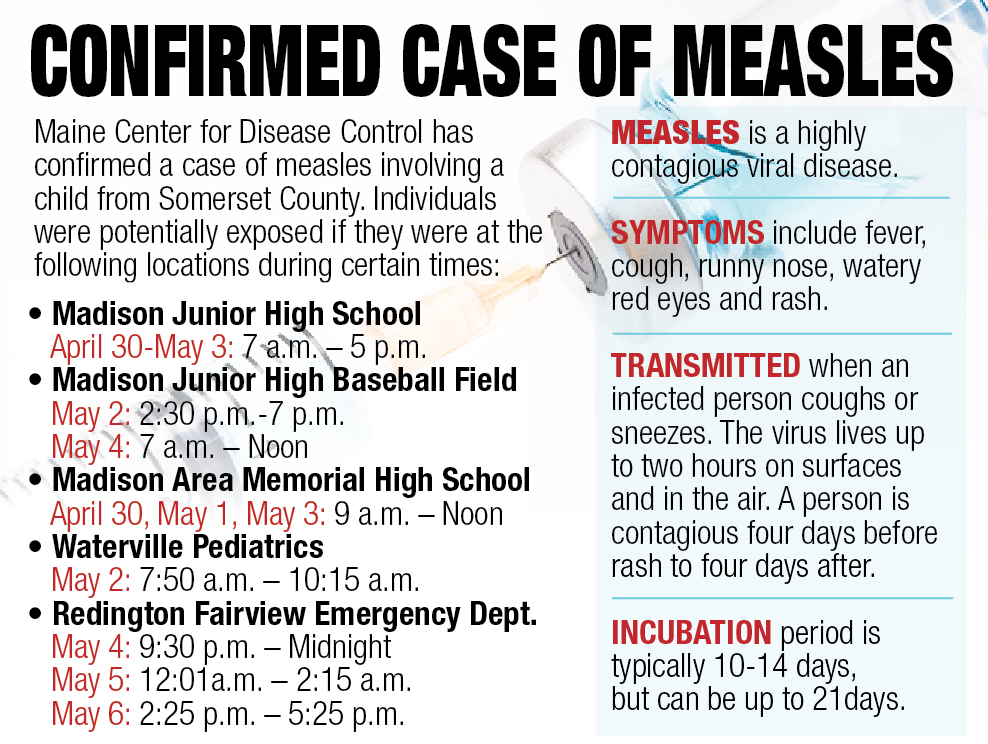An unnamed male student at Madison Junior High School was said Wednesday to have been the state’s first measles case in two years, the school district said in a letter to parents.
The Maine Center for Disease Control and Prevention reported the measles case Tuesday, adding Maine to the growing list of states affected by one of the nation’s most severe measles outbreaks in decades.
Maine is susceptible to infectious disease outbreaks because it has one of the nation’s lowest vaccination rates for students entering kindergarten, according to a news release from the Maine CDC.
“This letter is to inform you that a student of Madison Junior High School recently tested positive for measles and attended class at Madison Area Memorial High School,” Junior High School Principal Ryan Arnold said in the letter. “Measles is a highly contagious virus that lives in the nose and throat mucus of an infected person and can spread easily in school settings. It spreads to others through breathing, coughing, and sneezing. Measles virus can live for up to two hours in an airspace or on a surface where the infected person coughed or sneezed. Other people can breathe the contaminated air or touch an infected surface, then touch their eyes, nose, or mouth to become infected. Measles is so contagious that over 90% of people who are exposed and not immune will get the disease.”
The child had been vaccinated, did not have any serious complications, and is fully recovered from the disease. Maine CDC notified the facilities where potential exposure occurred and is working with them to ensure potentially exposed people are made aware.
“He is a junior high student,” Arnold said Wednesday. “We bus some of the students to the high school for one period to have opportunities to take other unified arts classes — industrial arts, health, foreign language and Jobs for Maine Grads.”
While the baseball field at the junior high school was cited as a possible location the student had visited, Arnold would not say whether the boy was a player or a visitor.
Arnold said parents have been made aware of the case but so far have not raised concern.
“We haven’t received any phone calls. The window of exposure was very small,” Arnold said by phone Wednesday morning. “The incubation period is about four days before and four days after the rash onset, and the student wasn’t here the whole time, so the CDC was concerned about April 30 to May 3. They worked with our school nurse to create a timeline of when the exposure was. I haven’t had any calls from parents. I’ve spoken to a few and there doesn’t seem to be any concern.”
Ryan said anyone who might have been exposed to the virus already would have seen rash symptoms appear, because it happened three weeks ago.
“Someone would already have symptoms if there was a problem now,” he said.
Bonnie Levesque, superintendent of Madison’s School Administrative District 59, said the school nurse, Monica Beach, can be reached at 696-3381 with any questions.
“Our nurse is working directly with the CDC to be sure everyone that needs to be notified has been,” Levesque said. “At this time, I think we have done all we can to be proactive in getting the information out. Folks are welcome to call if they have additional questions or concerns.”
It’s currently unknown where the student was exposed to measles, according to a news release from the Maine CDC. However, sporadic cases are not unexpected. As of today, 880 cases of measles have been confirmed in 24 states.
People potentially were exposed to measles if they were at the locations below during the following time periods:
| Location | Date | Time |
| Madison Junior High School | Tuesday, April 30
Wednesday, May 1 Thursday, May 2 Friday, May 3 |
7 a.m.-5 p.m. |
| Madison Junior High School’s baseball field | Thursday, May 2 | 2:30 p.m.-7 p.m. |
| Madison Junior High School’s Baseball Field | Saturday, May 4 | 7 a.m.-noon |
| Madison Area Memorial High School | Tuesday, April 30
Wednesday, May 1 Friday, May 3 |
9 a.m.-noon |
| Waterville Pediatrics | Thursday, May 2 | 7:50 a.m.-10:15 a.m. |
| Redington-Fairview General Hospital Emergency Department | Saturday, May 4 | 9:30 p.m.-midnight |
| Redington-Fairview General Hospital Emergency Department | Sunday, May 5 | 12:01 a.m.-2:15 a.m. |
| Redington-Fairview General Hospital Emergency Department | Monday, May 6 | 2:25 p.m.-5:25 p.m. |
Waterville Pediatrics and the Emergency Department at Redington-Fairview General Hospital in Skowhegan — where people potentially were exposed at certain times of day from April 30 to May 6 — also have been named.
People who might have been exposed should review their vaccine history and monitor for symptoms, the CDC said.
“Those who are not immunized or do not know their measles immunization status should get vaccinated with at least one dose of measles, mumps and rubella vaccine to protect from subsequent exposures,” the Maine CDC said. “Individuals who were exposed and begin to develop symptoms should contact their health providers for instructions before arriving at the providers’ offices or hospitals, to ensure precautions are taken to prevent further infection.
“If symptoms are consistent with the disease, testing may be performed to determine whether the individual is infected. Individuals without symptoms should not be tested.”
Measles usually begins with a high fever, cough, runny nose and red, watery eyes. Two or three days after symptoms begin, tiny white spots might appear inside the mouth. Three to five days after symptoms begin, a rash breaks out and usually begins as flat red spots on the hairline of the face and then spreads down the neck, trunk, arms, legs and feet. Small raised bumps also might appear on the top of the flat red spots.
Maine residents are asked to call their health care provider immediately if a family member develops signs or symptoms characteristic of measles. The health care provider will know what to do next and can make special arrangements to evaluate someone without putting other patients and staff at risk.
Meanwhile, the Maine House and Senate approved a bill that would eliminate all nonmedical exemptions to school-required vaccines. The Senate approved the bill by one vote last week. It faces at least one more procedural vote before heading to Gov. Janet Mills’ desk. She has indicated she supports the measure.
The last reported measles case in Maine was one confirmed case in 2017.
Carol Steward, support services director at Redington-Fairview, said the young patient came to the emergency room at the hospital during the dates noted in the CDC report but could not offer details because of Maine privacy laws.
“Yes, the patient presented here,” Steward said in an email to the Morning Sentinel. “I do not have access to the medical information — condition or treatment — because of HIPAA,” which is the Health Insurance Portability and Accountability Act of 1996, United States legislation that provides data privacy and security provisions for safeguarding medical information.
Adrienne Baker, a clinical nurse manager at Waterville Pediatrics on Kennedy Memorial Drive, which also was named as a location visited by the measles patient, confirmed by phone Wednesday that the patient had visited the clinic but said she could not comment on the case, again because of privacy laws.
“We would have to protect the rights and the privacy of our patients, but the only thing that I’m able to tell you is that we had seen that patient on May 2 and the risk of exposure, just like the CDC said, was between 7:50 a.m. and 10:15 a.m. on that date,” she said.
According to a four-page public health advisory issued Tuesday by the Maine Health Alert Network, the priority of the Maine measles case is high.
The best protection against measles is vaccination. MMR — measles, mumps and rubella — vaccine provides long-lasting protection against all strains of measles, according to the public health advisory. Some people who get two doses of MMR vaccine still might get measles if they are exposed to the virus, but the disease is usually milder and they are less likely to spread the disease to others.
Vaccination recommendations are below:
• Children: All children should receive two doses of MMR. The first dose should be given at 12 through 15 months of age and the second at 4 through 6 years of age. Children who are 6 through 11 months of age who will be traveling internationally should receive 1 dose of MMR vaccine. Every effort should be made to identify and vaccinate children who are not up to date.
• Adults: All adults should have acceptable proof of immunity to measles. For adults with no evidence of immunity to measles, 1 dose of MMR vaccine is recommended, unless the adult is in a high-risk group, such as international travelers, health care workers, and college students, in which case two doses of MMR vaccine are recommended. Women are advised to not receive any live virus vaccine during pregnancy, including MMR.
• All suspect cases of measles should be reported immediately by phone to 800-821-5821.
More information about measles can be found at maine.gov and cdc.gov/measles.
Copy the Story LinkSend questions/comments to the editors.





Success. Please wait for the page to reload. If the page does not reload within 5 seconds, please refresh the page.
Enter your email and password to access comments.
Hi, to comment on stories you must . This profile is in addition to your subscription and website login.
Already have a commenting profile? .
Invalid username/password.
Please check your email to confirm and complete your registration.
Only subscribers are eligible to post comments. Please subscribe or login first for digital access. Here’s why.
Use the form below to reset your password. When you've submitted your account email, we will send an email with a reset code.